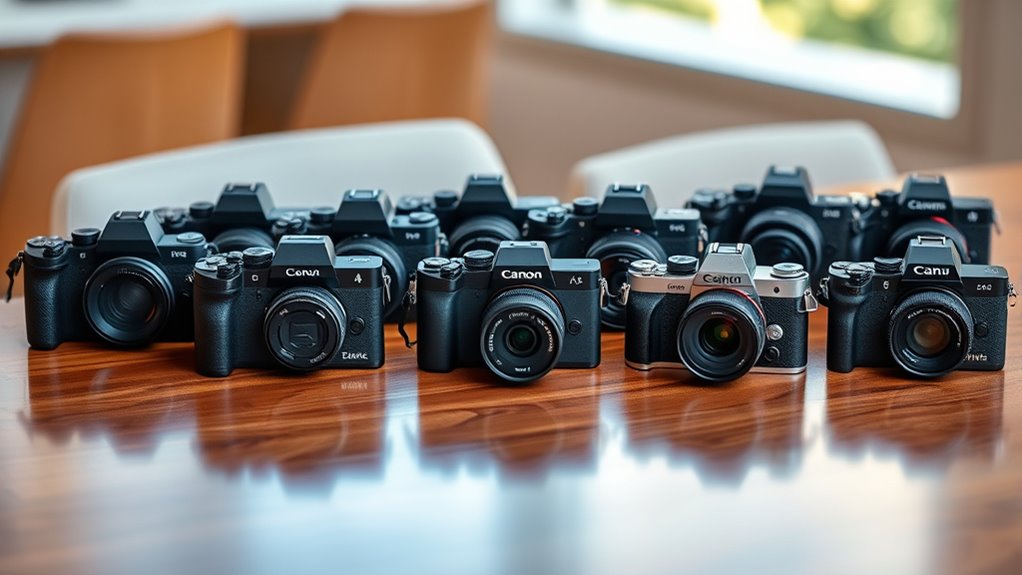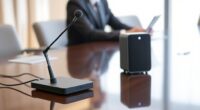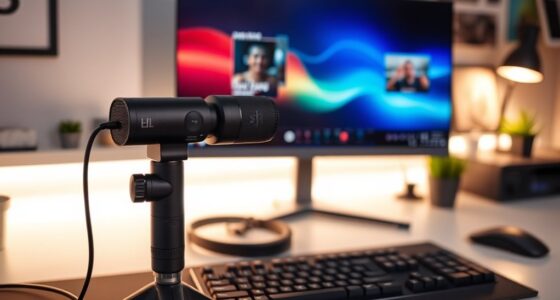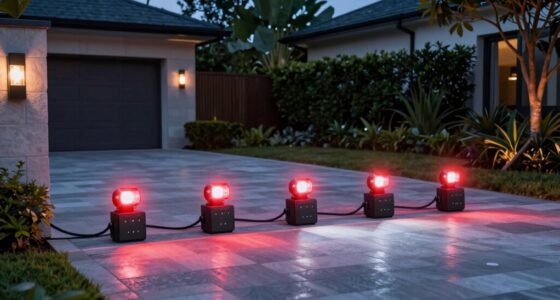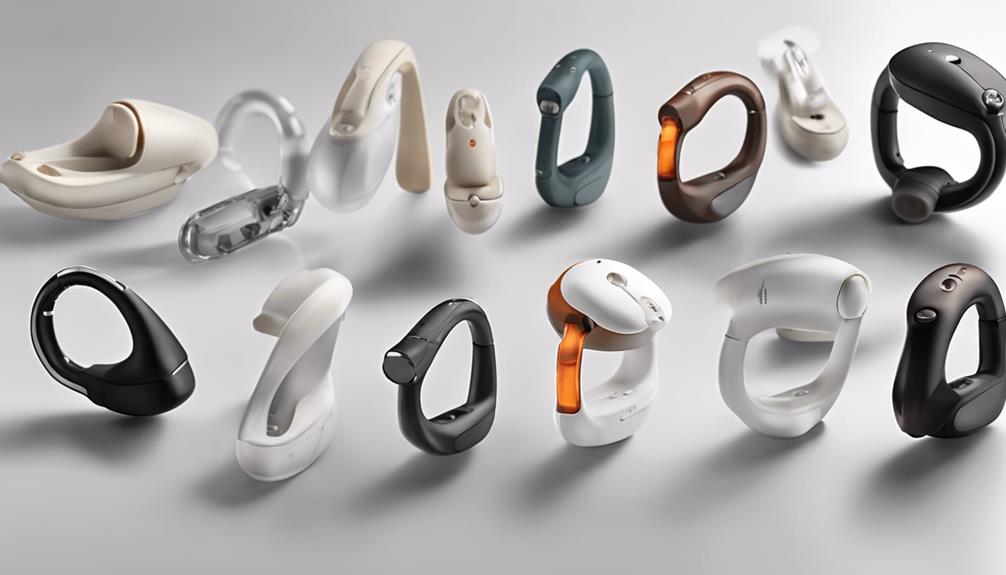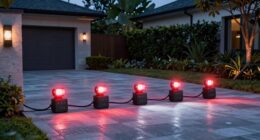Looking for the best beginner-friendly mirrorless cameras in 2025? I recommend models like the Canon EOS R100 and R50, Sony a6400, Nikon Z 30, and even options with full-frame sensors like the Sony a7 III. They’re lightweight, easy to use, and deliver stunning photos and videos with features like advanced autofocus and 4K recording. If you’re curious about more options and what suits your needs, there’s plenty more to explore below.
Key Takeaways
- Entry-level mirrorless cameras like Canon EOS R100 and Sony a6400 offer user-friendly interfaces and reliable autofocus for beginners.
- High-resolution sensors (24-88MP) ensure sharp, detailed images suitable for capturing stunning shots.
- 4K and 8K video capabilities enable beginners to create professional-quality multimedia content easily.
- Compact, lightweight designs with articulating touchscreens make framing and settings adjustments simple for new users.
- Additional accessories and features like Wi-Fi, bundled kits, and weather sealing enhance versatility and ease of use.
Canon EOS R100 Mirrorless Camera Kit
If you’re just starting out and want a compact, affordable camera that delivers excellent image quality, the Canon EOS R100 Mirrorless Camera Kit is a perfect choice. Its lightweight design makes it easy to carry around, ideal for capturing everyday moments on the go. The 24.1 Megapixel APS-C CMOS sensor guarantees sharp, detailed photos with natural bokeh. Plus, the powerful DIGIC 8 processor boosts performance and supports 4K video recording. With advanced autofocus, including eye and face detection, and a shooting speed of 6.5 fps, this camera helps you stay in focus during fast-paced shoots. It’s a versatile, user-friendly option for beginners.
Best For: beginners and casual photographers seeking a portable, easy-to-use camera with excellent image quality and versatile video options.
Pros:
- Compact and lightweight design for easy portability
- High-resolution 24.1 Megapixel APS-C CMOS sensor for sharp images
- Advanced autofocus with eye and face detection for accurate focusing
Cons:
- Limited zoom range with the included RF-S18-45mm lens
- No in-body stabilization, relying on lens stabilization only
- May lack advanced features for professional photographers
Canon EOS R50 Mirrorless Camera RF-S18-45mm F4.5-6.3 STM Lens Kit
The Canon EOS R50 Mirrorless Camera with RF-S18-45mm F4.5-6.3 STM Lens Kit stands out as an excellent choice for beginners seeking high-quality images and versatile video capabilities in a compact design. Its 24.2 MP APS-C sensor delivers sharp, detailed photos, while the DIGIC X processor guarantees fast processing and clarity. With 6K oversampled 4K video and high-frame-rate Full HD, it’s perfect for content creators. The lightweight build (~375g) makes it ideal for travel and vlogging. Its advanced autofocus, quick burst shooting, and user-friendly interface make capturing stunning shots easy, even in challenging lighting or fast-moving scenes.
Best For: beginners and content creators seeking a lightweight, versatile camera with excellent image and video quality for travel, vlogging, and everyday photography.
Pros:
- High-resolution 24.2 MP APS-C sensor delivers sharp, detailed images.
- Compact and lightweight (~375g), ideal for portability and travel.
- Advanced autofocus with deep learning technology ensures reliable tracking in motion.
Cons:
- Limited native lens options compared to full-frame systems.
- Some users find the documentation and tutorials insufficient for beginners.
- The variable aperture (F4.5-6.3) may be less ideal for low-light or artistic depth-of-field effects.
Sony Alpha a6400 Mirrorless Camera with 16-50mm Lens
For beginners seeking a versatile and user-friendly mirrorless camera, the Sony Alpha a6400 with its 16-50mm lens stands out as an excellent choice. It features a 20.1MP stacked CMOS sensor with fast autofocus using 425 phase and contrast detection points, covering 84% of the sensor. The camera shoots up to 11 frames per second, capturing crisp images with natural colors. It offers 4K video recording, along with time lapse and slow-motion options. The tiltable LCD screen makes framing easy from various angles, perfect for vlogging or photography. Included accessories like a rechargeable battery and AC adapter add to its convenience for beginners.
Best For: Beginners and casual photographers seeking a versatile, easy-to-use mirrorless camera with excellent autofocus and video capabilities.
Pros:
- Fast and accurate autofocus with 425 phase and contrast detection points covering 84% of the sensor
- 4K video recording with additional features like time lapse and slow motion
- Tiltable LCD screen suitable for vlogging and creative framing
Cons:
- Limited battery life, requiring extra batteries for extended shoots
- Slightly heavier than compact point-and-shoot cameras, which may affect portability
- No in-body image stabilization, relying on lens stabilization or post-processing
Canon EOS RP Full-Frame Mirrorless Camera with RF24-105mm Lens Kit
Designed for travelers and vloggers, the Canon EOS RP offers a full-frame experience in a compact, lightweight package. Its sleek black body pairs effortlessly with the RF24-105mm lens, providing versatile zoom and sharp image quality. The lens’s optical stabilization ensures steady shots, while its macro capabilities let me capture fine details up close. I love its ability to record 4K UHD videos, perfect for professional-looking content. Plus, I can easily use it as a webcam with EOS Utility or HDMI output for live streaming. Overall, the EOS RP combines portability and performance, making it an ideal choice for those who want high-quality images without the bulk.
Best For: travelers and vloggers seeking a compact, high-quality full-frame camera with versatile zoom and excellent video capabilities.
Pros:
- Compact and lightweight design ideal for travel and vlogging
- 4K UHD video recording for professional-quality content
- Versatile RF24-105mm lens with optical image stabilization and macro capabilities
Cons:
- Autofocus performance may vary in low light conditions
- Limited maximum aperture (f/4-7.1) may not be ideal for shallow depth of field
- Battery life could be limited for extended shooting sessions
Nikon Z 30 Mirrorless Camera
If you’re looking for a compact, user-friendly camera perfect for vlogging, streaming, or content creation, the Nikon Z 30 stands out as an excellent choice. It’s the smallest, lightest mirrorless camera in Nikon’s Z series, designed for creators on the go. Its ergonomic body is easy to hold and features a flip-out touchscreen, ideal for selfies and flexible framing. The camera supports 4K video at 30p without cropping and offers reliable autofocus with eye-tracking for people and pets. Compatible with Nikon’s entire line of NIKKOR Z lenses, it’s versatile enough to grow with your skills. Built for outdoor use, it also includes weather sealing and straightforward controls.
Best For: content creators, vloggers, and streamers seeking a compact, user-friendly camera with excellent video and autofocus features.
Pros:
- Compact, lightweight design ideal for portable use and handheld shooting
- 4K video at 30p with no crop and reliable eye-tracking autofocus for people and pets
- Weather sealing and compatibility with NIKKOR Z lenses for versatility and durability
Cons:
- Overheating during extended 4K recording sessions
- Lacks in-body image stabilization (IBIS) and a built-in viewfinder
- Crowded ports requiring adapters for certain connections
Canon EOS R100 Mirrorless Camera Kit with 24.1MP APS-C Sensor, 4K Video, RF Mount, Bundle with 64GB Card & Shoulder Bag
The Canon EOS R100 Mirrorless Camera Kit is an excellent choice for beginners seeking a compact yet versatile camera that delivers high-quality images and videos. Its 24.1MP APS-C CMOS sensor provides sharp detail and natural bokeh, perfect for capturing moments with clarity. The lightweight, small design makes it easy to carry around, especially with the included shoulder bag. It features 4K video recording, fast autofocus with eye and face detection, and continuous shooting at 6.5 fps. Bundled with a 64GB SD card and versatile RF-S18-45mm lens, this kit offers everything needed to start exploring photography with ease.
Best For: beginners and casual photographers seeking a compact, versatile camera that offers high-quality images and videos with easy portability.
Pros:
- Lightweight and compact design ideal for travel and everyday use
- High-resolution 24.1MP sensor delivers sharp, detailed images with natural bokeh
- 4K video recording and advanced autofocus features enhance multimedia capabilities
Cons:
- Limited maximum aperture (f/4.5-6.3) may affect low-light performance
- Autofocus performance might be less advanced compared to higher-end models
- No built-in flash, requiring external accessories for additional lighting
Canon EOS Rebel T7 DSLR Camera with 18-55mm Lens
For beginners seeking a reliable entry-level DSLR, the Canon EOS Rebel T7 with an 18-55mm lens offers an excellent balance of simplicity and quality. It features a 24.1 MP APS-C CMOS sensor and DIGIC 4+ processor, ensuring sharp images and smooth performance. The camera supports Full HD video recording and has a 9-point autofocus system with AI Servo AF for tracking moving subjects. Its optical viewfinder provides about 95% coverage, making framing easy. With built-in Wi-Fi and NFC, sharing photos is quick. Compatible with Canon EF lenses, it’s a versatile choice for those just starting their photography journey.
Best For: beginners looking for an easy-to-use DSLR camera that delivers reliable image quality and versatile features.
Pros:
- User-friendly interface ideal for newcomers to photography
- 24.1 MP sensor produces sharp, high-resolution images
- Built-in Wi-Fi and NFC for quick sharing and connectivity
Cons:
- Limited to Canon EF and EF-S lenses, excluding EF-M options
- Optical viewfinder covers approximately 95%, which may slightly limit framing accuracy
- No 4K video recording capability, only Full HD
8K Digital Camera for Photography with 88MP, WiFi, Dual-Lens, 16X Zoom, Touch Screen, 2 Batteries & Stand
This K Digital Camera stands out for beginners who want professional-quality images and versatile features in one compact device. With an 88MP sensor and 8K UHD video, it delivers stunning clarity and detail in every shot. The dual lenses make selfies and vlogging easy, while the 16X zoom offers flexibility for distant subjects. The 3.2-inch touch screen simplifies framing and settings, and the 360° rotary dial provides quick mode switching. Built-in WiFi allows instant sharing, and with two batteries plus a stand, you get extended shooting time. Whether capturing moments or creating content, this camera combines power and convenience for beginners enthusiastic to elevate their photography.
Best For: beginners and enthusiasts seeking professional-quality images and versatile features in a compact, easy-to-use digital camera.
Pros:
- Ultra-high-definition 88MP sensor and 8K UHD video for stunning clarity and detail
- Dual lenses and 16X zoom provide flexibility for selfies, vlogging, and distant subjects
- Built-in WiFi and compatibility with iSmart DV2 app enable instant sharing and live streaming
Cons:
- May be larger or heavier than basic compact cameras, affecting portability
- Advanced features might require some learning curve for complete beginners
- Limited to 32GB SD card included; additional storage may be needed for extensive shooting
Panasonic LUMIX G7KS 4K Mirrorless Camera
If you’re looking for a compact and versatile mirrorless camera that offers professional-quality video and sharp images, the Panasonic LUMIX G7KS 4K is an excellent choice for beginners. It captures stunning photos with its 16MP Live MOS sensor and records 4K Ultra HD video with no time limits, perfect for vlogs or creative projects. The camera features fast, versatile autofocus modes, face/eye detection, and a touchscreen for easy operation. Weighing around 400g, it’s lightweight and portable, with a wide range of compatible lenses, making it ideal for travel, daily shooting, or hobbyist use. Plus, its Wi-Fi connectivity simplifies sharing and remote control.
Best For: beginners and hobbyists seeking a portable, high-quality mirrorless camera for versatile photography and 4K video recording.
Pros:
- Compact, lightweight design weighing around 400g for easy portability
- 16MP Live MOS sensor delivers sharp images and vibrant videos in various lighting conditions
- Wide range of autofocus modes including face/eye detection and tracking for precise subject focus
Cons:
- Image stabilization relies on lens IS, not in-body, which may require compatible lenses for stability
- Some reported issues with serial number disappearance, though supported by warranty
- Slightly sluggish autofocus performance in video mode under certain conditions
Canon EOS R100 Mirrorless Camera with RF-S 18-45mm f/4.5-6.3 IS STM Lens
The Canon EOS R100 is an excellent choice for beginners seeking an easy-to-use, compact mirrorless camera that delivers high-quality images. It features a 24.1MP APS-C CMOS sensor and DIGIC 8 processor, producing vibrant photos and smooth 4K video. The kit includes the versatile RF-S 18-45mm lens with built-in image stabilization, perfect for portraits, landscapes, and vlogging. Its fast Dual Pixel CMOS AF ensures quick, accurate focus on moving subjects. With a clear OLED viewfinder, a responsive touchscreen, and built-in Wi-Fi and Bluetooth, it’s designed for effortless sharing and learning, making it ideal for those starting their photography journey.
Best For: beginners and first-time DSLR users seeking a compact, easy-to-use mirrorless camera for everyday photography, travel, and vlogging.
Pros:
- User-friendly interface with auto scene modes and simplified menu navigation
- Compact and lightweight design ideal for portability and travel
- High-quality images and 4K video capabilities with fast, accurate autofocus
Cons:
- Limited lens options compared to more advanced systems
- Lacks in-body stabilisation, relying on lens stabilization only
- Basic viewfinder resolution may be less detailed than higher-end models
Panasonic LUMIX G85 4K Digital Camera
For beginners seeking a camera that combines portability with professional-level features, the Panasonic LUMIX G85 4K Digital Camera stands out. Its magnesium alloy body and weather sealing ensure durability without adding weight, making it travel-friendly. The compact design fits comfortably in my hand, and the articulating touchscreen enhances shooting angles. The 16-megapixel Micro Four Thirds sensor captures detailed images, while in-body 5-axis stabilization keeps shots sharp. With versatile 12-60mm lens, excellent 4K video, and intuitive controls, this camera offers great value. It’s perfect for those starting out but enthusiastic to explore both photography and videography with confidence.
Best For: beginners and enthusiast photographers and videographers seeking a portable, durable, and feature-rich camera for both stills and 4K video.
Pros:
- Compact, lightweight, and travel-friendly design with weather sealing for durability
- Excellent in-body 5-axis stabilization combined with versatile lens options for sharp images and smooth videos
- Intuitive controls and articulating touchscreen enhance usability for both photography and videography
Cons:
- Autofocus can be sluggish in low-light conditions or during 4K video recording
- Wi-Fi connectivity may be inconsistent or finicky at times
- Lacks a headphone jack for audio monitoring during video recording
Sony Alpha a7 III Mirrorless Camera Kit with 128GB & Editing Software
Standing out as an excellent choice for beginners aiming to explore both photography and videography, the Sony Alpha a7 III Mirrorless Camera Kit combines impressive performance with user-friendly features. Its 24.2MP full-frame sensor delivers stunning image quality, while 4K UHD video recording and fast autofocus make capturing moments easy. The kit includes a versatile 28-70mm lens, extra batteries, and a basic set of accessories, plus a 5-piece editing software package. Although some accessories may feel cheap or incompatible, reviews praise the camera’s overall value and performance. With a 1-year warranty and competitive pricing, it’s a solid option for those wanting professional features without complexity.
Best For: beginners and casual enthusiasts seeking a versatile, high-quality mirrorless camera with basic accessories for photography and videography.
Pros:
- Excellent image quality with a 24.2MP full-frame sensor and 4K UHD video recording
- User-friendly features and versatile modes suitable for beginners
- Competitive price point with included accessories and software package
Cons:
- Some accessories, such as the tripod and flash, may feel cheap or be incompatible
- Occasional reports of damaged or missing items like SD cards and software
- Accessory quality and durability can vary, and some parts may be fragile
Sony a7 III Full-Frame Mirrorless Camera with 28-70mm Lens
If you’re looking for a versatile full-frame camera that combines excellent image quality with user-friendly features, the Sony a7 III with its 28-70mm kit lens is an outstanding choice for beginners. It boasts a 24.2MP back-illuminated sensor, providing stunning detail and dynamic range. The autofocus system, with eye and face tracking, ensures sharp images in various conditions. It supports 4K HDR video, shoots up to 10fps, and has dual SD card slots for reliable storage. Its compact, lightweight design makes it easy to carry, while customizable controls help streamline your workflow. Overall, the Sony a7 III offers professional-grade quality in a beginner-friendly package.
Best For: beginners and enthusiasts seeking a versatile full-frame mirrorless camera with excellent image quality and user-friendly features.
Pros:
- Exceptional image quality with a 24.2MP full-frame sensor and wide dynamic range
- Fast and reliable autofocus with eye and face tracking for sharp images
- Compact, lightweight design with dual SD card slots and customizable controls
Cons:
- Limited touchscreen functionality primarily for focusing, not full input
- Only one UHS-II SD card slot, which may be restrictive for professional workflows
- No 10-bit color depth support, limiting advanced video post-processing options
Canon EOS R50 Mirrorless Camera Kit with Accessories
The Canon EOS R50 Mirrorless Camera Kit is an excellent choice for beginners who want high-quality content without the complexity of advanced systems. It features an APS-C RF sensor and a versatile 18-45mm lens, perfect for wide-angle shots, portraits, and street photography. With 4K video, Dual Pixel AF II, and a vari-angle touchscreen, it’s easy to shoot sharp photos and smooth videos. The kit includes a Canon EOS 200ES shoulder bag and a 64GB SD card, making it ready to go. Its lightweight, user-friendly design makes it ideal for new creators aiming for professional-looking photos and videos effortlessly.
Best For: beginners and aspiring content creators seeking a lightweight, easy-to-use camera with high-quality 4K video and versatile shooting options.
Pros:
- User-friendly design ideal for newcomers and vloggers
- Compact and lightweight for easy portability and daily use
- Includes essential accessories like a shoulder bag and SD card for instant setup
Cons:
- Limited lens options compared to higher-end systems
- APS-C sensor may not perform as well in low-light conditions as full-frame cameras
- Some advanced features may be limited for more experienced photographers
Canon EOS R50 Mirrorless Camera with Shoulder Bag and 64GB Card
For beginners looking for a versatile and user-friendly camera, the Canon EOS R50 with shoulder bag and 64GB card is an excellent choice. It features a 24.2MP APS-C CMOS sensor and DIGIC X processor, delivering sharp images and smooth 4K video. Its compact size doesn’t compromise performance, with fast 15fps burst shooting and Dual Pixel CMOS AF II for accurate focus on people, pets, and vehicles. The fully articulating touchscreen simplifies framing, while built-in stereo microphones enhance audio quality. Seamlessly connect via Wi-Fi and Bluetooth to share your shots instantly. The bundle’s shoulder bag and 64GB card make it perfect for beginners enthusiastic to explore photography and videography with confidence.
Best For: beginner photographers and videographers seeking an easy-to-use, versatile camera for travel, vlogging, and everyday photography.
Pros:
- User-friendly interface with guided controls and advanced auto modes
- Compact, lightweight design ideal for travel and vlogging
- High-quality 4K video and fast 15fps burst shooting for capturing dynamic moments
Cons:
- Limited battery life may require extra batteries for extended shoots
- No built-in viewfinder, which might be a drawback for some users
- Slightly higher price point compared to basic entry-level cameras
Factors to Consider When Choosing Mirrorless Cameras for Beginners
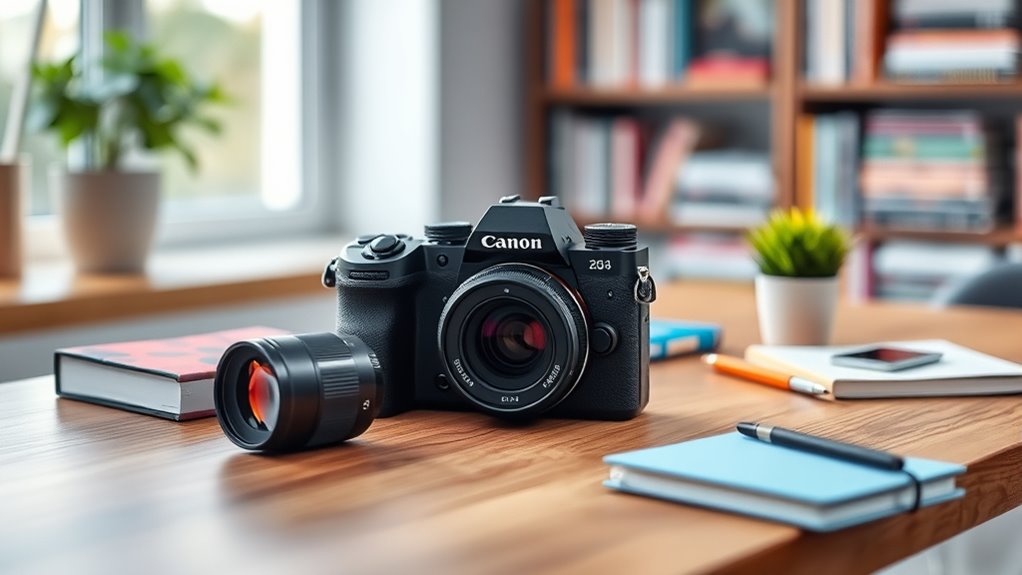
When choosing a mirrorless camera as a beginner, I focus on ease of use, budget, and key features like autofocus and video quality. It’s also important to take into account lens compatibility to guarantee your camera can grow with your skills. By keeping these points in mind, you’ll find a model that fits your needs and helps you develop your photography.
Ease of Use
Choosing a mirrorless camera that’s easy to operate can make all the difference for beginners. Look for models with intuitive controls, simplified menus, and automatic scene modes—these features help you learn quickly and reduce frustration. Touchscreens, tilting displays, and guided interfaces make steering through settings straightforward, so you can focus on capturing great shots without getting lost in complex options. Cameras with fewer customizable buttons and a clean layout also ease the learning curve, making it less intimidating to explore different functions. Built-in auto-focus with face and eye detection ensures sharp images in various scenarios, even when you’re just starting out. Easy-to-understand mode dials and settings mean you can start shooting quality photos and videos with minimal technical knowledge right from the beginning.
Price Range
Budget plays a crucial role in selecting the right mirrorless camera for beginners. Most beginner-friendly models fall between $500 and $1,200, making them accessible for new photographers. Entry-level options usually have simple controls and auto modes, perfect for those just starting out. Mid-range cameras under $1,000 often feature better image sensors, faster autofocus, and improved video capabilities, offering more versatility. For those willing to invest a bit more, high-end beginner models priced between $1,000 and $1,200 include advanced features like 4K video, higher megapixel sensors, and durable build quality. It’s essential to balance your budget with your desired features, ensuring you get the best value for your money without overspending or compromising on what matters most for your photography journey.
Autofocus Features
A camera with advanced autofocus features can make a significant difference in capturing sharp, well-focused images, especially for beginners still mastering focus techniques. Look for models with systems like Dual Pixel CMOS AF or phase-detection points for quick, precise focusing. Face, eye, or subject detection autofocus helps keep moving or stationary subjects sharp, which is vital when you’re learning. Real-time tracking modes are also valuable, especially if you plan to shoot video or fast-moving scenes. Pay attention to the number of autofocus zones or points—more coverage means better focus across the frame. Finally, consider how well the autofocus performs in different lighting conditions, including low light, to guarantee consistent focus accuracy no matter where or when you’re shooting.
Video Capabilities
When selecting a mirrorless camera for beginners, paying attention to its video capabilities can greatly enhance your filming experience. Look for cameras that support 4K or higher resolution recording to guarantee sharp, high-quality footage. High frame rates, like 60 fps or above, are vital for smooth slow-motion shots. An advanced autofocus system with face, eye, or subject tracking helps keep your subjects sharp and in focus during recording. Check if the camera offers a microphone input and headphone jack—these are essential for better audio control and monitoring. Additionally, creative video modes like focus stacking, focus breathing correction, and built-in stabilization can markedly improve your production quality, making your videos look more professional and polished.
Lens Compatibility
Choosing a mirrorless camera with broad lens compatibility is essential for expanding your creative options. I recommend checking if it supports a wide range of lenses, including native and third-party options, so you’re not limited in your choices. Make sure to verify the mount type—like Sony E-mount, Canon RF, or Nikon Z—to ensure lenses are compatible with your system. If you want more flexibility, see if the camera allows lens adapters, which let you use lenses from other mounts. Also, consider the variety of focal lengths and apertures available, matching your style and needs. Finally, think about future upgrades—will the camera support new lenses down the road? This long-term flexibility helps you grow as a photographer without constantly changing systems.
Size and Weight
Since portability is key for many beginners, considering the size and weight of a mirrorless camera can make a significant difference in your shooting experience. Smaller, lighter cameras are easier to carry, allowing you to shoot comfortably for extended periods without fatigue. Their compact design also makes discreet photography simpler and storage in small bags or pockets more convenient. Reduced weight helps stabilize handheld shots, improving overall image quality and comfort during long shoots. Portability is especially beneficial for travel, vlogging, or daily casual use. However, keep in mind that choosing a lightweight camera might mean sacrificing some grip size or built-in features. Finding the right balance between size, weight, and ergonomic comfort guarantees your camera suits your shooting style and needs.
Frequently Asked Questions
What Are the Key Differences Between APS-C and Full-Frame Sensors?
The main difference between APS-C and full-frame sensors is size. I find that full-frame sensors are larger, allowing for better light capture, which results in higher image quality, especially in low-light conditions. APS-C sensors are smaller, making cameras more compact and affordable, but they can have more noise at high ISO settings. If you want professional-looking shots, a full-frame camera might be the better choice.
How Important Is Lens Selection for Beginner Mirrorless Cameras?
Think of lens selection like choosing the right pair of shoes for an adventure; it can make or break your experience. For beginner mirrorless cameras, having versatile lenses is essential because they let you explore different styles, from wide landscapes to detailed portraits. A good lens can turn your camera into a powerful tool, helping you learn and grow as a photographer without feeling limited by your gear.
Which Camera Features Are Most Vital for Beginner Photographers?
I believe the most essential features for beginner photographers are user-friendly controls, good autofocus, and a versatile sensor. These make capturing sharp, well-exposed images easier and less frustrating. A camera with intuitive menus and helpful guides boosts confidence, while fast autofocus ensures you don’t miss moments. Plus, a decent sensor offers better image quality in different lighting conditions, helping you grow your skills without feeling overwhelmed.
How Does Camera Weight Affect Ease of Use for Beginners?
Think of camera weight like carrying a backpack—lighter feels more like a gentle breeze, making it easier to explore and practice. For beginners, a lighter camera means less fatigue and more comfort during long shoots or extended use. It’s like having a trusty sidekick that won’t weigh you down, allowing you to focus on capturing stunning shots rather than struggling with cumbersome gear.
What Are the Best Accessories to Complement a Beginner Mirrorless Camera?
I recommend starting with a versatile lens, like a kit zoom, to cover various shooting scenarios. A spare battery guarantees you don’t miss shots, while a sturdy camera bag keeps everything protected. A microfiber cloth helps keep your lens clean, and a small tripod can stabilize your shots for better quality. These accessories boost your confidence and improve your photos without overwhelming you as a beginner.
Conclusion
Choosing the right mirrorless camera is like finding the perfect pair of shoes—it has to feel right and fit your style. I remember starting out with my first mirrorless, feeling like I was holding a tiny, powerful treasure chest. Whether you go for Canon, Sony, or Nikon, remember it’s about capturing your unique moments. Trust your instincts, and soon you’ll be creating images as vibrant as your imagination.

